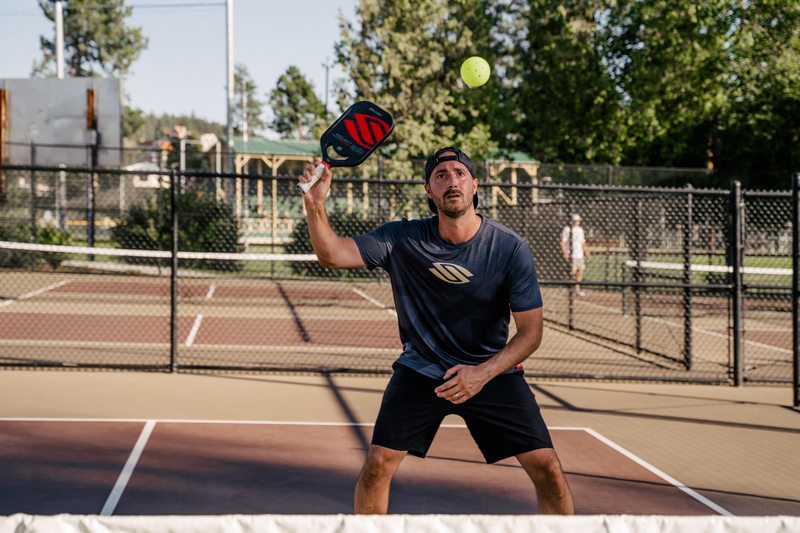The momentum rule in pickleball is one of the most commonly misunderstood rules of pickleball. The momentum rule has to do with both the pickleball kitchen rules and the pickleball volley. Here are the details of the pickleball momentum rule:
Pickleball momentum (Definition 3.A.21)
In pickleball, you cannot volley a ball while standing in the kitchen zone. But you also cannot fall into the kitchen zone due to momentum caused by a volley, even if that volley was hit while your feet were outside the kitchen zone.
The official USA Pickleball momentum rule says that momentum is "a body in motion… that causes the player to continue in motion after contacting the ball."
Momentum in pickleball is when you hit a volley outside the non-volley zone (or kitchen), and the momentum from that hit or run causes you to step or fall into the kitchen zone.
Pickleball momentum rules (Rule 9)
The pickleball momentum rule says that all volleys must be initiated outside the non-volley zone. For players using wheelchairs, their front wheels may touch the non-volley zone when they volley.
If the volleying player, or anything they are wearing or touching, touches the kitchen zone “while in the act of volleying,” it is considered a fault. This includes before, during, or after contacting the ball.
Your swing, follow-through, and momentum are all considered a part of the volley in pickleball.
Items you are touching
If you volley the ball in pickleball, it is a fault if you momentum causes you to contact anything that is touching the kitchen. This can include:
- Your clothing.
- Your partner (this is sometimes called the “2-Becomes-1 Rule”).
- Your paddle.
- Your shoes.
- A towel or anything else that falls off your body.
Re-establishing your feet
If you have touched the non-volley zone before a volley, you must re-establish your feet outside the kitchen before volleying the ball — which means that you must make contact with the playing surface with both feet completely and outside the kitchen.
You cannot stand in the kitchen and then jump to hit a ball, even if your feet land outside the kitchen after hitting the ball.
Can your pickleball partner stop you from falling in the kitchen?
If you hit a volley and your momentum is about to take you into the kitchen, your partner is allowed to grab you and pull you back to stop you from falling into the zone.
When can you be in the pickleball kitchen?
Any player is allowed to enter the kitchen at any time, except when they are volleying a ball. You may continue to stand in the kitchen if you are returning a ball that has bounced, and you may enter the NVZ before or after hitting that ball that has bounced.
You can also volley a ball at any time outside the kitchen zone, if you are following the kitchen rule and the momentum rule, even if your partner is standing in the kitchen (unless you are touching them).
When does momentum end?
The most misunderstood piece of the momentum rule has to do with how long momentum lasts after you hit your volley. According to USA Pickleball:
"The act of volleying produces momentum that ends when the player regains balance and control of their motion or stops moving toward the non-volley zone."
In other words, the momentum does not end until after you regain your balance outside the kitchen zone, without having ever stepped into the kitchen. There is no other time rule associated with momentum — it all has to do with regaining your balance.
- If your opponent hits the ball back and then your momentum takes you into the kitchen zone, it is still a fault on you.
- If the ball is declared dead and then your momentum takes you into the kitchen zone, it is still a fault on you.
- If the rally ends and then your momentum takes you into the kitchen zone, it is still a fault on you.
- If the game ends and everyone goes home and then your momentum takes you into the kitchen zone, it is still a fault on you.

